The Chrysalis Academy provides a three month residential programme for young men and women from the Western Cape, South Africa aimed at building their resilience. The criteria for admission to the programme are that applicants are aged between 18 – 25; not in education, training or employment; are residents of the Western Cape, have a minimum Grade 9 qualification and have no criminal record.
The programme is holistic in nature in that it focusses on all the known dimension of a human being – the physical, mental, emotional, energetic and spiritual dimensions. Our mission is to unleash the potential of all our students through an integrated learning journey. Furthermore, the programme is structured and regimented to enable effective learning and teaching to take place.
The three month programme consists of various phases to build a range of competencies and to afford young people meaningful opportunities, to grow, learn, overcome challenges that may have blocked their growth and development in the past and above all to discover their vast potential and strengths. During the three month programme, they attend classes focussing on personal mastery, anger management, health and nutrition, interpersonal skills, leadership skills, and then move into the beautiful outdoors for two weeks to experience the beauty of the province by hiking, swimming and generally learning about the unique biodiversity in the province. Thereafter, they attend 4 weeks of vocational training to acquire skills such as basic cookery, welding, public safety, or sports coaching which enable them to study further or find entry level work after graduation.
Their last three weeks is spent preparing themselves for work, compiling CV’s and preparing for graduation. All in all a life-changing experience! Upon graduation at the end of the three months, the Chrysalis Academy with one of its key strategic partners find work placement for all graduates for a period of nine months aimed at affording them a much needed opportunity to acquire work experience. For this they receive a monthly stipend. The Chrysalis Academy makes contact with each graduate every quarter and continues to provide after care support for a period of 5 years.
Central to the Academy’s programme is personal mastery.
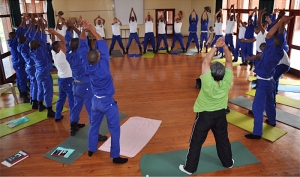
The academy believes that individuals cannot build personal mastery without mindfulness. In fact, a holistic approach has mindfulness embedded within it, as without paying attention, one is not able to discover the various dimensions of one’s being.
As a result of the many deep-seated issues that our students are grappling with, we provide an extensive therapeutic programme aimed at building resilience. Many South Africans unfortunately still continue to experience high levels of violence in their communities which continue to leave deep scars on the psyche.
The therapeutic programme is varied and made possible by many fantastic and dedicated volunteers and consists of Mindfulness, Yoga, Meditation, Karate and self-defence, Journaling, Poetry and Nature-based activities. As can be seen all of these programmes cultivate mindfulness. Eight weekly sessions are held on a Thursday afternoon for 2 hours each.
So how do we define Mindfulness?
Why is this so essential to the transformation of our students?
We use the classic definition as espoused by the well-known Dr Kabat-Zinn that:
“Mindfulness is moment by moment awareness, without judgement, preference, evaluation”.
We do the classic “Meeting the raison exercise” in our 4 hour session and do a fun assessment of their current “state of mindfulness” through a questionnaire that the Academy has developed. They are guided to observe their state of mindfulness without judgment, evaluation or preference.
Students take to Kabat-Zinn’s definition beautifully and then start practising eating mindfully, polishing their shoes mindfully and walking more mindfully from day One. We do laughter Yoga which is a fun way of staying in the present moment. The 4 hour personal mastery sessions ends with the classic body scan. Unfortunately, however due to the fact that students get up at 04h30 for their physical fitness, they fall off to sleep. We pick this up again in our therapeutic programme.
What are the benefits of mindfulness?
Mindfulness brings our students into the present moment.
For many, this is a new experience, as they often try to avoid present moment experiences. They admit their thoughts are mostly on the past or way into the future. As a result of abuse and neglect, some students resort to using illegal substances, and a small percentage may even inflict physical harm onto themselves. Mindfulness is therefore taught as an attitude, an approach, and a new way of being in the world. It teaches us that we do not need to run away from our pain, grief, fear. We can cultivate the ability to observe these emotions and then begin to investigate with kindness the reasons for our fear or discomfort. Often this attitude of initial acceptance, allows a natural awareness to arise and for the “charge” to be dampened.
Mindfulness teaches our students to “Stay with discomfort” and not jump to change the discomfort by using substances or other quick fixes.
It is therefore a key quality to building resilience, which is the process of not only learning to bounce back after setbacks, but to transcend their challenging circumstances.
Key Competencies in Training
After my three years as CEO at the Chrysalis Academy, I enrolled for a M.Phil in Management Coaching at one of the local South African Universities, the University of Stellenbosch. This is a two year programme based on a range of disciplines such as Adult Education, Psychology, Neuroscience, and many others. Many of the key competencies required of management coaches such as deep listening, paying attention, cultivating trust and building rapport fall in the Mindfulness basket and the programme has really assisted me to deepen my own personal practices. I now also coach students using a mindfulness-based approach. Apart from working with students, the Academy is now being approached by other non-governmental organisations to do mindfulness work. One such is NICRO, who work with inmates in local South African prisons.
A testimonial from NICRO
Dearest Lucille,
We humbly thank you, with much thanksgiving, for the session you had with us on Friday. You had our staff riveted to what you were saying and demonstrating. I received very positive feedback from staff. It was indeed something so different for some, and this morning in the kitchen heard all sorts of wonderful comments like:
“Thank you for the session on Friday..It was so different…I never looked at life that way.”
“Today for the first time, I paid attention to the water falling on my body while I showered..”
“I became more mindful of what I was eating this weekend!”
“I felt more alive being more aware.”
There was also a noticeable change of attitude in staff this morning. I myself did my breathe exercises, which was something I was grateful for, and shared the ‘meeting a raisin exercise’ with many over this weekend. JJ
Comments sent by Ms V. Padayachee, National Advocay Manager fro NICRO, following a two hour introductory session on Mindfulness
Further Information
To follow this and other posts on Mindfulness, Yoga and Ayurveda, please sign up to the CMI mailing list. To receive specific updates on Ayurveda, ensure you select ‘Ayurveda’ updates.
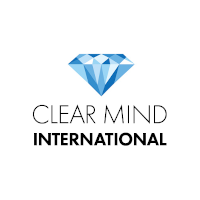

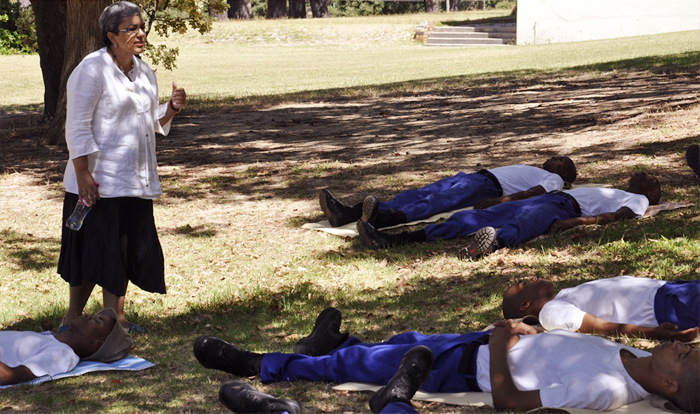



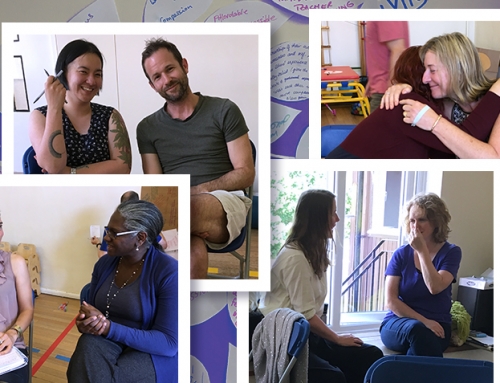

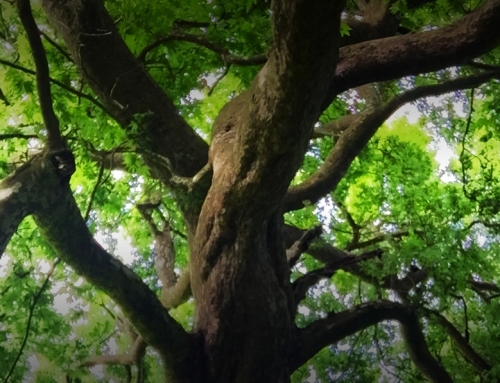
Leave A Comment